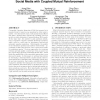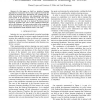373 search results - page 12 / 75 » Building Relational World Models for Reinforcement Learning |
ATAL
2007
Springer
14 years 1 months ago
2007
Springer
Temporal difference reinforcement learning algorithms are perfectly suited to autonomous agents because they learn directly from an agent’s experience based on sequential actio...
WWW
2009
ACM
14 years 8 months ago
2009
ACM
Community Question Answering (CQA) has emerged as a popular forum for users to pose questions for other users to answer. Over the last few years, CQA portals such as Naver and Yah...
ISCAS
2002
IEEE
14 years 18 days ago
2002
IEEE
We have implemented an aspect of learning and memory in the nervous system using analog electronics. Using a simple synaptic circuit we realize networks with Hebbian type adaptati...
KR
2004
Springer
14 years 1 months ago
2004
Springer
To learn to behave in highly complex domains, agents must represent and learn compact models of the world dynamics. In this paper, we present an algorithm for learning probabilist...
IROS
2007
IEEE
14 years 2 months ago
2007
IEEE
— In this paper we build an imitation learning algorithm for a humanoid robot on top of a general world model provided by learned object affordances. We consider that the robot h...


